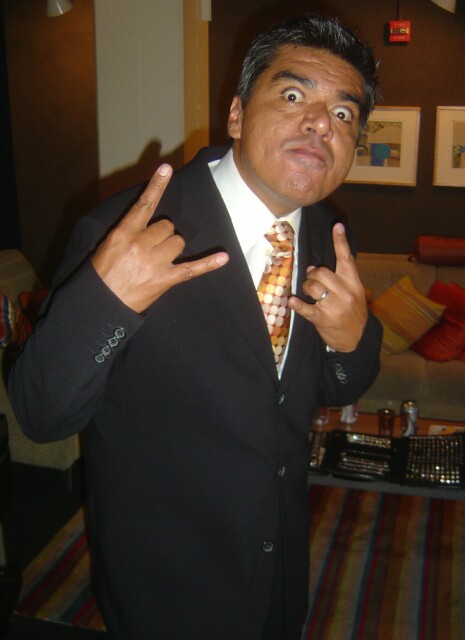My friend Jorge Hernandez and I both spoke at the Missouri Milk, Food and Environmental Health Association annual meeting in Columbia, Missouri on April 2, 2010.
 We never plan these things because we’re both busy – Jorge in his crisp, tailored suit, talking about all the meals U.S. Foodservice serves in a day, me looking ever more rumpled and frumpy as I evolve into the professor’s outfit of patches on the elbows of the corduroy suit jacket in my future. But our talks were surprisingly complimentary. Jorge (right, not exactly as shown) with his self-deprecating Mexican jokes, me just looking weird.
We never plan these things because we’re both busy – Jorge in his crisp, tailored suit, talking about all the meals U.S. Foodservice serves in a day, me looking ever more rumpled and frumpy as I evolve into the professor’s outfit of patches on the elbows of the corduroy suit jacket in my future. But our talks were surprisingly complimentary. Jorge (right, not exactly as shown) with his self-deprecating Mexican jokes, me just looking weird.
Jorge took a similar message to the Conference for Food Protection meeting in Rhode Island this week, calling for the creation of integrated food safety cultures within the farm-to-fork food safety system.
“The best way to ensure the right food safety and HACCP behaviors from employees, suppliers, and customers is to make sure there are clear benefits and rewards for excellence,” said Hernandez, U.S. Foodservice’s senior vice president, food safety and quality assurance. “A culture of continuous improvement must be developed at all levels of the food chain.”
Jorge gets it, which is good considering the number of safe meals US Foodservice provides on a daily basis. He also likes to say, trust, but verify, which is appropriately apt when dealing with food safety.
I’m not sure John Coyne, vice-president of legal and corporate affairs for Unilever Canada gets it. He told a recent symposium,
"We are not just in the protection business, we are in the anticipation business. … (The) 2008 listeria event shook our entire industry; going forward, if we fail to anticipate food safety risks, it will be at our peril” and he encouraged companies to adopt a "culture of courage" when it comes to food safety.
The 22 people who died in the Canadian listeria outbreak were not an event: they were a preventable tragedy. Have the courage to call it accurately, Coyne. When I was in Missouri earlier this month I asked the audience of sanitarians, didn’t the nursing homes where all these Canadians died have dieticians and how brilliant was it to be giving immuno-compromised elderly folks cold-cuts that were a known listeria risk? A woman interjected and stated,
“I’m a dietician.”
“OK”
“We got one hour of food safety training.”
“Is that god or bad?”
“It’s awful.”
